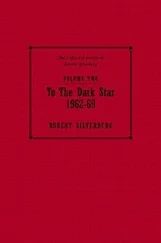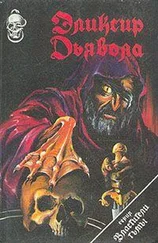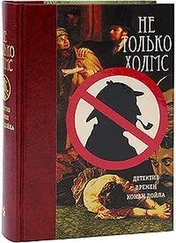After he became tired of alternately examining it and sniffing it, he put it in his pocket and began an uneasy tour of his room.
If it had been entered and ransacked, everything had been replaced exactly as he had left it, as well as he could remember. Nothing excepting this handkerchief and the wax on the key indicated intrusion; nothing, apparently, had been disturbed; and yet there was the handkerchief; and there was the wax on the end of his door key.
"Here's a fine business!" he muttered to himself; and rang for his steward.
The man came—a cockney, dense as his native fog—who maintained that nobody could have entered the stateroom without his knowledge or the knowledge of the stewardess.
"Do you think she's been in my cabin?"
"No, sir."
"Call her."
The stewardess, an alert, intelligent little woman with a trace of West Indian blood in her, denied entering his stateroom. Shown the handkerchief and invited to sniff it, she professed utter ignorance concerning it, assured him that no lady in her section used that perfume, and offered to show it to the stewardesses of other sections on the chance of their identifying the perfume or the handkerchief.
"All right," said Neeland; "take it. But bring it back. And here's a sovereign. And—one thing more. If anybody pays you to deceive me, come to me and I'll outbid them. Is that a bargain?"
"Yes, sir," she said unblushingly.
When she had gone away with the handkerchief, Neeland closed the door again and said to the steward:
"Keep an eye on my door. I am positive that somebody has taken a wax impression of the keyhole. What I said to that stewardess also holds good with you. I'll outbid anybody who bribes you."
"Very good, sir."
"Sure it's good! It's devilish good. Here's a beautiful and newly minted gold sovereign. Isn't it artistic? It's yours, steward."
"Thanky, sir."
"Not at all. And, by the way, what's that invalid gentleman's name?"
"'Awks, sir."
"Hawks?"
"Yes, sir; Mr. 'Erbert 'Awks."
"American?"
"I don't know, sir."
"British?"
"Shall I inquire, sir?" starting to go.
"Not of him ! Don't be a lunatic, steward! Please try to understand that I want nothing said about this matter or about my inquiries."
"Yes, sir."
"Very well, then! Find out, if you can, who Mr. Herbert Hawks is. Find out all you can concerning him. It's easy money, isn't it?"
"Oh, yes, sir―"
"Wait a moment. Has he any friends or relatives on board?"
"Not that I know, sir."
"Oh, no friends, eh? No ladies who wear white serge skirts and white shoes and stockings?"
"No, sir, not as I knows of."
"Oh! Suppose you step across to his door, knock, and ask him if he rang. And, if the door is opened, take a quick slant at the room."
"Very good, sir."
Neeland, his door at the crack, watched the steward cross the corridor and knock at the door of Mr. Herbert Hawks.
"Well, what iss it?" came a heavy voice from within.
"Mr. 'Awks, sir, did you ring?"
"No, I did not."
"Oh, beg pardon, sir―"
The steward was starting to return to Neeland, but that young man motioned him violently away from his door and closed it. Then, listening, his ear against the panel, he presently heard a door in the passage creak open a little way, then close again, stealthily.
He possessed his soul in patience, believing that Mr. Hawks or his fair friend in the white skirt had merely taken a preliminary survey of the passage and perhaps also of his closed door. But the vigil was vain; the door did not reopen; no sound came from the stateroom across the passageway.
To make certain that the owner of the white shoes and stockings did not leave that stateroom without his knowledge, he opened his door with many precautions and left it on the crack, stretching a rubber band from knob to bolt, so that the wind from the open port in the passage should not blow it shut. Then, drawing his curtain, he sat down to wait.
He had a book, one of those slobbering American novels which serve up falsehood thickly buttered with righteousness and are consumed by the morally sterilised.
And, as he smoked he read; and, as he read he listened. One eye always remained on duty; one ear was alert; he meant to see who was the owner of the white shoes if it took the remainder of the voyage to find out.
The book aided him as a commonplace accompaniment aids a soloist—alternately boring and exasperating him.
It was an "uplift" book, where the heroine receives whacks with patient smiles. Fate boots her from pillar to post and she blesses Fate and is much obliged. That most deadly reproach to degenerate human nature—the accidental fact of sex—had been so skilfully extirpated from those pages that, like chaste amoebæ, the characters merely multiplied by immaculate subdivision; and millions of lineal descendants of the American Dodo were made gleeful for $1.50 net.
It was hard work waiting, harder work reading, but between the two and a cigarette now and then Neeland managed to do his sentry go until dinner time approached and the corridors resounded with the trample of the hungry.
The stewardess reappeared a little later and returned to him his handkerchief and the following information:
Mr. Hawks, it appeared, travelled with a trained nurse, whose stateroom was on another deck. That nurse was not in her stateroom, but a similar handkerchief was, scented with similar perfume.
"You're a wonder," said Neeland, placing some more sovereigns in her palm and closing her fingers over them. "What is the nurse's name?"
"Miss White."
"Very suitable name. Has she ever before visited Herr—I mean Mr. —Hawks in his stateroom?"
"Her stewardess says she has been indisposed since we left New York."
"Hasn't been out of her cabin?"
"No."
"I see. Did you inquire what she looked like?"
"Her stewardess couldn't be certain. The stateroom was kept dark and the tray containing her meals was left at the bedside. Miss White smokes."
"Yes," said Neeland reflectively, "she smokes Red Light cigarettes, I believe. Thank you, very much. More sovereigns if you are discreet. And say to my steward that I'll dine in my stateroom. Soup, fish, meat, any old thing you can think of. Do you understand?"
"Perfectly, sir."
When she had withdrawn he kneeled down on his sofa and looked out through the port at the sunset sea.
There was a possibility that Scheherazade and her friends might be on board the Volhynia . Who else would be likely to take wax impressions of his keyhole and leave a scented scrap of a handkerchief on his stateroom floor?
That they had kept themselves not only out of sight but off the passenger list merely corroborated suspicion. That's what they'd be likely to do.
And now there was no question in his mind of leaving the box in his cabin. He'd cling to it like a good woman to alimony. Death alone could separate his box from him.
As he knelt there, sniffing the salt perfume of the sea, his ears on duty detected the sound of a tray in the corridor.
"Leave it on the camp–table outside my door!" he said over his shoulder.
"Very good, sir."
He was not hungry; he was thinking too hard.
"Confound it," he thought to himself, "am I to squat here in ambush for the rest of the trip?"
The prospect was not agreeable for a man who loved the sea. All day and most of the starry night the hurricane deck called to him, and his whole anatomy responded. And now to sit hunched up here like a rat in the hold was not to his taste. Suppose he should continue to frequent the deck, carrying with him his box, of course. He might never discover who owned the white serge skirt or who owned the voice which pronounced is as "iss."
Читать дальше












